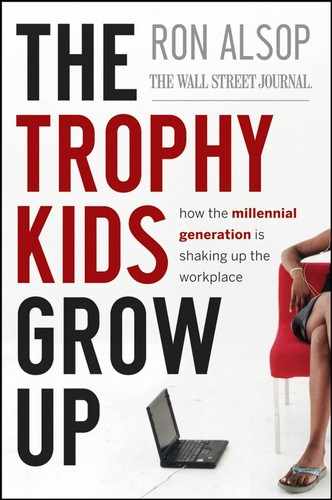11.3. TIME TO TEACH
To attract millennials, some companies are giving them the best of both worlds. They are partnering with Teach for America, letting new recruits go off and teach for a couple of years in poor communities before starting their jobs. Some employers even pay signing bonuses in advance, before the teaching assignment begins.
Companies had noticed the millennial generation's growing interest in Teach for America and feared they would lose some of their prime prospects to the program. In 2008, Teach for America attracted nearly 25,000 applicants and placed more than 3,700 new teachers in classrooms across the United States, the most ever in its 18-year history.
"Companies saw that they weren't just competing with other corporations for talent; they were increasingly competing with us as well, for students with good grade-point averages and leadership positions on campus," says Matt Kramer of Teach for America. "Now more of them are starting to realize that there's no need to recruit against us. They can recruit the same people we are, but give them two years to develop their leadership skills and have a significant community service experience in the classroom before coming on board."
Starting with J.P. Morgan Chase & Co. in 2006, the partnership program has grown to include some of the major campus recruiters, especially in the financial services and management consulting fields. Among the partners: Citigroup Inc., Goldman Sachs Group Inc., McKinsey, General Electric, and Bain & Co.
Google Inc. also has become a partner, giving two-year deferrals to millennials accepted by Teach for America. During their classroom experience, they are paired with a Google mentor and given a summer internship at Google between their first and second year in Teach for America. "The two-year deferral is ideal because they're not too long away from the business," says Jordan Bookey, a diversity programs manager at Google. "But it still gives young people time to do a little more exploration before settling into a job."
In addition to the deferrals for its own full-time hires, Google is participating in joint recruiting events with Teach for America and is interested in meeting with its alumni after they have finished their teaching stints. "Teach for America does a good job of picking people who are much like the kind of employees we're looking for—creative go-getters," Bookey says. "We also believe their classroom skills are transferable because in both teaching and working for Google, you need to be self-motivated and able to manage a lot of different things and communicate information to a lot of different people. You also need to bring some humor and lightheartedness to the classroom and the job."
For Daniel Marks, a Princeton University graduate, the Teach for America partnership was one of the major selling points when he considered a career at J.P. Morgan Chase. He plans to join the bank full-time in 2009 after finishing his Teach for America assignment at a public high school in Chicago. He received his signing bonus up front, which "wasn't a deal breaker but was still extremely important to me," he says. "It was another sign that J.P. Morgan is behind me and supportive of my work for Teach for America."
Marks felt inspired by a Teach for America presentation during his summer internship at J.P. Morgan. "I was shocked into action by hearing how terrible some inner-city high schools are and the impact that people my age could have," he says. "It got me thinking of the opportunities and advantages that got me to where I was."
Since he started teaching chemistry and physics at the Chicago high school, Marks has found it stressful and heartbreaking at times. He has been amazed to meet teenagers who read at a first-grade level and take 30 seconds to solve a simple subtraction problem. He is also dismayed to see students harassed by gang members on their way to school and 15-yearold girls who are already pregnant.
"But working with students can be an unbelievable joy, too," Marks says. He recalls the exhilaration he felt when a failing student worked with a classmate to improve his math and critical thinking skills and managed to get the highest test score in class one day. "It's going to be difficult," he says, "to walk away after making all these personal connections with the students and the school."
